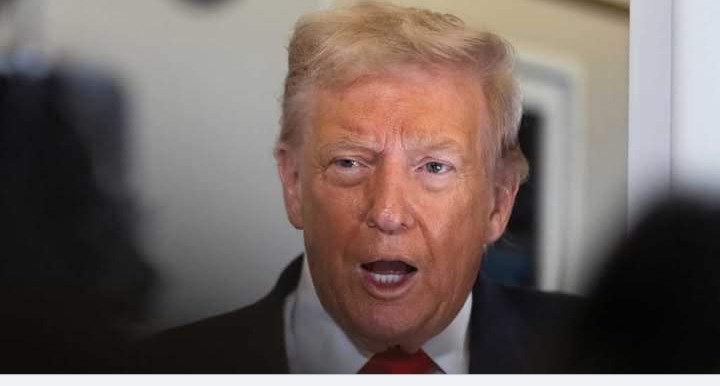NEWS
Trump threaten Nigeria with potential military action, Trump declared via social media that Christianity in Nigeria was “facing an existential threat,” alleging that “thousands of Christians” were being killed by “radical Islamists.” here is how Ahmed Tinubu pushed back against….

Trump threaten Nigeria with potential military action
The threat came after President Bola Ahmed Tinubu pushed back against Trump’s designation of Nigeria as a “country of particular concern” for alleged persecution of Christians.
U.S. President Donald Trump threatens military action against Nigeria amid designation over Christian persecution
In a sharp escalation of diplomatic pressure, President Donald Trump announced that Nigeria had been designated a “country of particular concern” (CPC) for alleged large‑scale persecution of Christians, and warned that failure by Nigeria’s government to act could trigger U.S. military intervention. ([Sky News][1])
—
### What the U.S. says
On October 31, 2025, Trump declared via social media that Christianity in Nigeria was “facing an existential threat,” alleging that “thousands of Christians” were being killed by “radical Islamists.” ([CBS News][2])
In that announcement he labelled Nigeria as a CPC under the International Religious Freedom Act, a designation that allows the U.S. to consider sanctions — including halting non‑humanitarian aid. ([The Washington Post][3])
Further, recent reports say the President directed the U.S. Department of Defense to “prepare for possible action” in Nigeria if the Nigerian government fails to stop such violence. ([The Washington Post][4])
—
### Nigeria’s reaction
President Bola Ahmed Tinubu publicly rejected the U.S. accusations, stating that the characterization of Nigeria as religiously intolerant “does not reflect our national reality.” His government affirmed its commitment to freedom of religion and belief for all citizens. ([The Washington Post][4])
Observers note, however, that analysts point out the violent attacks in Nigeria are complex: while Christian communities suffer significantly, many of the victims are Muslim, especially in the north. ([CBS News][2])
—
### Context and significance
* Nigeria is one of the world’s most religiously and ethnically diverse countries, with roughly equal populations of Christians and Muslims, and a wide variety of ethnic groups.
* For years, Nigeria has faced violent insurgencies (such as Boko Haram and its break‑off Islamic State West Africa Province), inter‑communal clashes (often herder‐farmer conflict in the Middle Belt), kidnappings and banditry. The layering of communal, economic, regional and religious motives complicates the picture. ([India Today][5])
* The CPC designation had been applied to Nigeria earlier (2020) but later removed; its re‑imposition signals a shift in U.S. policy and a harder line toward Nigeria’s religious‑freedom record. ([Premium Times Nigeria][6])
—
### Potential consequences
* A formal CPC designation gives the U.S. government legal authority to impose aid cuts, restrict loans or exports, or apply sanctions under the IRFA framework. ([downloads.frc.org][7])
* If military action were actually pursued, it would mark a dramatic escalation in U.S.–Nigeria relations — with serious implications for regional stability, sovereignty issues and Nigeria’s internal security strategy.
* The threat also places significant diplomatic pressure on Abuja to demonstrate results in protecting vulnerable religious communities, and may push Nigeria to seek alternative alliances or aid sources.
—
### What to watch
* Whether the U.S. follows through with formal sanctions or aid cuts (beyond the designation).
* How Nigeria responds in practice: will there be evidence of new government initiatives to protect at‐risk religious communities, faster prosecution of attackers, or revised security strategy?
* The reaction of other major stakeholders: Nigerian regional neighbors, African Union, international human‑rights organisations — whether they align with U.S. concerns or defend Nigeria’s internal context.
* Domestic Nigerian political ramifications: how the Tinubu administration handles public perception, both domestically and internationally, and whether this affects internal stability.
* Whether the U.S. military preparations referenced by Trump translate into actual deployment or are leveraged instead for diplomatic pressure.
—
### Final thought
The episode reflects how religious‑freedom concerns, security issues, and geopolitical influence can intersect in complex ways. While the U.S. frames its move as defending persecuted Christians, Nigeria and many observers point to broader structural forms of violence not solely driven by religion. For Nigeria, navigating the diplomatic fallout and securing internal stability will be key. For the U.S., following through with credible, measured action — rather than rhetorical threat alone — will determine how this moment influences future relations.
Would you like me to check further commentary from Nigeria’s government or regional responses to this?












